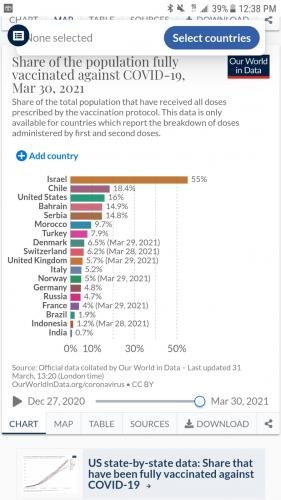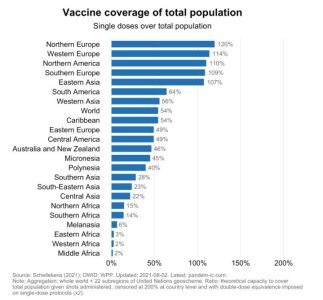- Joined
- Mar 19, 2015
- Runs
- 15,745
Wealthy countries - including the UK - are blocking proposals to help developing nations increase their vaccine manufacturing capabilities, documents leaked to BBC Newsnight show.
Several poorer countries have asked the World Health Organization to help them.
But richer nations are pushing back on provisions in international law that would enable them to achieve this.
This is according to a leaked copy of the negotiating text of a WHO resolution on the issue.
Among those richer nations are the UK, the US, as well as the European Union.
"Where we could have language in there that would make it easier for countries to produce more vaccines and more medicines within their country, it would include initiatives that would finance and facilitate that. The UK is on the opposite side of the argument of trying to remove those kinds of progressive proposals from the text," says Diarmaid McDonald, from Just Treatment, a patient group for fair access to medicines.
A spokesperson for the UK government says "a global pandemic requires a global solution and the UK is leading from the front, driving forward efforts to ensure equitable access around the world to Covid vaccines and treatments".
The spokesperson says the UK is one of the largest donors to international efforts to ensure over one billion doses of coronavirus vaccines get to developing countries this year.
If and when governments should intervene to ensure affordable supplies of medicines is a long-standing issue.
But the ability of different countries to source vaccines and drugs has been highlighted by the pandemic.
Read more:
https://www.bbc.com/news/world-56465395
Several poorer countries have asked the World Health Organization to help them.
But richer nations are pushing back on provisions in international law that would enable them to achieve this.
This is according to a leaked copy of the negotiating text of a WHO resolution on the issue.
Among those richer nations are the UK, the US, as well as the European Union.
"Where we could have language in there that would make it easier for countries to produce more vaccines and more medicines within their country, it would include initiatives that would finance and facilitate that. The UK is on the opposite side of the argument of trying to remove those kinds of progressive proposals from the text," says Diarmaid McDonald, from Just Treatment, a patient group for fair access to medicines.
A spokesperson for the UK government says "a global pandemic requires a global solution and the UK is leading from the front, driving forward efforts to ensure equitable access around the world to Covid vaccines and treatments".
The spokesperson says the UK is one of the largest donors to international efforts to ensure over one billion doses of coronavirus vaccines get to developing countries this year.
If and when governments should intervene to ensure affordable supplies of medicines is a long-standing issue.
But the ability of different countries to source vaccines and drugs has been highlighted by the pandemic.
Read more:
Many experts say equitable access to vaccines is essential to prevent cases and deaths and to contribute to global population immunity.
But the global capacity for producing vaccines is about a third of what is needed, says Ellen t'Hoen, an expert in medicines policy and intellectual property law.
"These are vaccines that are produced in wealthy countries and are in general kept by those wealthy countries.
"Developing nations are saying we need to have a share of the pie, not only the share of the vaccines, but also the share of the right to produce these vaccines," she adds.
To make a vaccine you not only need to have the right to produce the actual substance they are composed of (which is protected by patents), you also need to have the knowledge about how to make them because the technology can be complex.
The WHO does not have the authority to sidestep patents - but it is trying to bring countries together to find a way to bolster vaccine supplies.
The discussions include using provisions in international law to get around patents and helping countries to have the technical ability to make them.
But the drug industry argues that eroding patents would hinder its ability to invest in future treatments for Covid and other illnesses.
Earlier this month, representatives of the US drug industry wrote to US President Joe Biden to share their concerns.
"Eliminating those protections would undermine the global response to the pandemic," they wrote, including ongoing efforts to tackle new variants.
It would also create confusion that could potentially undermine public confidence in vaccine safety, and create a barrier to information sharing, the representatives said.
"Most importantly, eliminating protections would not speed up production," they added.
Others agree. Anne Moore, an expert in vaccine immunology, worries about what impact undermining patents will have on future research.
"Over time we see fewer and fewer organisations and commercial companies being in the vaccine field because there's so little return on it," she says.
Drug companies point out they have also donated financially and given medicines to help tackle the pandemic.
But campaigners argue that about £90bn ($125bn) of public money has gone into developing Covid treatments and vaccines so the public should have a stake. Once the pandemic ends, there is a lot of money to be made, they say.
"It's obvious that there are longer-term plans to increase the price of these vaccines once the most urgent phase of the pandemic is over. So that is another reason why developing countries are saying we need to gain the ability to produce these vaccines ourselves now," Ms t'Hoen says.
But the global capacity for producing vaccines is about a third of what is needed, says Ellen t'Hoen, an expert in medicines policy and intellectual property law.
"These are vaccines that are produced in wealthy countries and are in general kept by those wealthy countries.
"Developing nations are saying we need to have a share of the pie, not only the share of the vaccines, but also the share of the right to produce these vaccines," she adds.
To make a vaccine you not only need to have the right to produce the actual substance they are composed of (which is protected by patents), you also need to have the knowledge about how to make them because the technology can be complex.
The WHO does not have the authority to sidestep patents - but it is trying to bring countries together to find a way to bolster vaccine supplies.
The discussions include using provisions in international law to get around patents and helping countries to have the technical ability to make them.
But the drug industry argues that eroding patents would hinder its ability to invest in future treatments for Covid and other illnesses.
Earlier this month, representatives of the US drug industry wrote to US President Joe Biden to share their concerns.
"Eliminating those protections would undermine the global response to the pandemic," they wrote, including ongoing efforts to tackle new variants.
It would also create confusion that could potentially undermine public confidence in vaccine safety, and create a barrier to information sharing, the representatives said.
"Most importantly, eliminating protections would not speed up production," they added.
Others agree. Anne Moore, an expert in vaccine immunology, worries about what impact undermining patents will have on future research.
"Over time we see fewer and fewer organisations and commercial companies being in the vaccine field because there's so little return on it," she says.
Drug companies point out they have also donated financially and given medicines to help tackle the pandemic.
But campaigners argue that about £90bn ($125bn) of public money has gone into developing Covid treatments and vaccines so the public should have a stake. Once the pandemic ends, there is a lot of money to be made, they say.
"It's obvious that there are longer-term plans to increase the price of these vaccines once the most urgent phase of the pandemic is over. So that is another reason why developing countries are saying we need to gain the ability to produce these vaccines ourselves now," Ms t'Hoen says.







